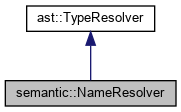
Classes | |
| struct | Pkg |
| Represents a tree of packages. The leaf nodes are declarations. More... | |
Public Types | |
| using | ConstImport = std::variant< ast::Decl const *, Pkg const * > |
| using | ConstImportOpt = std::optional< ConstImport > |
Public Member Functions | |
| NameResolver (BumpAllocator &alloc, diagnostics::DiagnosticEngine &diag) | |
| Construct a new Name Resolver object. More... | |
| void | Init (ast::LinkingUnit *lu, ast::Semantic *sema) |
| Initializes a new Name Resolver object given the entire linking unit (and all its symbols). After this, call Resolve() to resolve all types in the linking unit. More... | |
| void | ResolveType (ast::UnresolvedType *type) override |
| Resolves the type in-place (does not return anything) More... | |
| ConstImportOpt | GetImport (ast::CompilationUnit const *cu, std::string_view name, std::pmr::memory_resource *r=std::pmr::get_default_resource()) const |
| Get an import object from the import table of the given compilation unit. This object can either be a package or a declaration. More... | |
| auto | GetJavaLang () const |
| Get a struct with all the java.lang.* classes and interfaces. Also includes java.io.Serializable for some reason. More... | |
| auto | GetArrayPrototype () const |
| Get the Array Prototype object. This is a decl representing the prototype of the array class. | |
| void | BeginContext (ast::CompilationUnit *cu) |
| Called to begin the resolution of a compilation unit. This will build the import table (and any other data structures) to help resolve types within the compilation unit. More... | |
| void | EndContext () |
| Called to end the resolution of a compilation unit. This will clear the current compilation unit being resolved. | |
| void | dump () const |
| Dumps the symbol and import tables to the output stream. | |
| void | dumpImports (ast::CompilationUnit const *cu) const |
| Dumps the import table to the output stream. | |
| void | dumpImports () const |
| Dumps the import table to the output stream. | |
Detailed Description
Definition at line 29 of file NameResolver.h.
Constructor & Destructor Documentation
◆ NameResolver()
|
inline |
Construct a new Name Resolver object.
- Parameters
-
alloc The bump allocator to use for all allocations. diag The diagnostic engine to use for all diagnostics.
Definition at line 81 of file NameResolver.h.
Member Function Documentation
◆ BeginContext()
| void semantic::NameResolver::BeginContext | ( | ast::CompilationUnit * | cu | ) |
Called to begin the resolution of a compilation unit. This will build the import table (and any other data structures) to help resolve types within the compilation unit.
- Parameters
-
cu The compilation unit to begin resolution for.
Definition at line 173 of file NameResolver.cc.
◆ GetImport()
| NameResolver::ConstImportOpt semantic::NameResolver::GetImport | ( | ast::CompilationUnit const * | cu, |
| std::string_view | name, | ||
| std::pmr::memory_resource * | r = std::pmr::get_default_resource() |
||
| ) | const |
Get an import object from the import table of the given compilation unit. This object can either be a package or a declaration.
- Parameters
-
cu The compilation unit to get the import from. name The name of the import to get. r An optional memory resource to use for allocations.
- Returns
- ConstImport Returns nullopt if the import is not found. Otheriwse, returns the import object from the import table. Note, the package object will never be null. However, a declaration object can be null if the import-on-demand results in an unresolvable declaration.
Definition at line 437 of file NameResolver.cc.
◆ GetJavaLang()
|
inline |
Get a struct with all the java.lang.* classes and interfaces. Also includes java.io.Serializable for some reason.
- Returns
- auto An anonymous struct with all the java.lang.* types.
Definition at line 126 of file NameResolver.h.
◆ Init()
|
inline |
Initializes a new Name Resolver object given the entire linking unit (and all its symbols). After this, call Resolve() to resolve all types in the linking unit.
- Parameters
-
lu The linking unit to resolve.
Definition at line 91 of file NameResolver.h.
◆ ResolveType()
|
overridevirtual |
Resolves the type in-place (does not return anything)
- Parameters
-
type The unresolved type to resolve.
Implements ast::TypeResolver.
Definition at line 311 of file NameResolver.cc.
References ast::ReferenceType::resolveInternal(), and ast::UnresolvedType::toString().
The documentation for this class was generated from the following files:
- include/semantic/NameResolver.h
- lib/semantic/NameResolver.cc